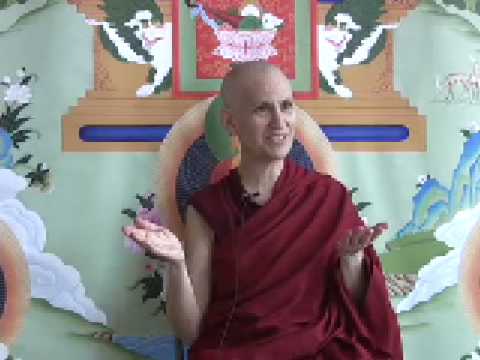Verse 33-4: The kindness of the Three Jewels
Part of a series of talks on the 41 Prayers to Cultivate Bodhicitta from the Avatamsaka Sutra (the Flower Ornament Sutra).
- The kindness of the Buddha in teaching the Dharma
- The kindness of the masters who have preserved the Dharma
- Our great fortune, and having gratitude, for having access to the Dharma today
41 Prayers to cultivate bodhicitta: Verse 33-4 (download)
“May all beings repay the kindness of all buddhas and bodhisattvas.”
This is the prayer of the bodhisattva when seeing someone repaying another’s kindness.
I wanted to talk about the kindness of the buddhas and bodhisattvas today. Think about how hard they practiced the path, and it was for our benefit. It wasn’t for their own personal benefit. It was completely for the benefit of all sentient beings. Then they taught the path.
We have the kindness of the Buddha in teaching the path. He was enlightened at age 35—from the normal view—and spent the next 45 years wandering around teaching all different kinds of people. What energy that took. What kindness it was. Many people go all around talking, giving seminars on how to make more money, or get out of your lawsuit. All of the drug companies—the doctors and the pharmaceutical companies—travel and have big luncheons, explain what the new medicine is, get the doctors to go and advocate for it and things like that. But when the Buddha traveled he didn’t ask for any money in the process of it. He had nothing to sell and he completely just gave the Dharma to whoever was there and open and receptive.
Then you have this whole lineage starting from the Buddha, coming down to us, from masters who similarly worked hard on the path to actualize it and taught without any concern for their own benefit. Without living in lavish palaces and avoiding paying income taxes at the same time as a result of doing their vast seminars, just forgetting a few numbers here and there. These are people who just completely taught for the benefit of others. Because of their kindness—2,600 years of kindness—these people not only were teaching, but practicing, writing commentaries, explaining, clarifying questions, guiding disciples. Because of all of their kindness, we have the dharma today.
It’s very important for us to think: “What would have happened if the Buddha had not thought the Dharma?” As the story goes, when he first got enlightened, he said, “I am not going to teach, because nobody is going to understand.” Now what would have happened to us if the Buddha had not taught the Dharma? If there had been a Buddha in this world, but he had not taught the Dharma? Or what would have happened if the Buddha had taught the Dharma and there was no lineage coming down to us?
When you think about this: “What would my life be like? What would the difference in my life be if I were born at the same time but there was no teachings around?” That helps us to see the kindness of the Buddha and the kindness of the Sangha. Because it was with the Sangha—those who had the realization of emptiness—who were able to really understand it and then teach it to others. Then we have the kindness of the regular sangha, the monastic community, because those were often the people who wrote the teachings down and then printed them and edited them. All these kinds of things.
There is a lot of kindness involved in our having access to the teachings nowadays. It’s important to see that kindness of the Three Jewels and really feel that in your heart so that we feel this connection, and regard for them, and appreciation. You really understand why His Holiness sometimes says that he has to thank Mao Zedong, because due to Mao Zedong he was able to make so many other friends, meaning us. In a very strange way we have to thank Mao Zedong as well. Otherwise, the Dharma would still be locked in Tibet and we would not have access to it. Just think about that and how much we have received throughout the years.
Venerable Thubten Chodron
Venerable Chodron emphasizes the practical application of Buddha’s teachings in our daily lives and is especially skilled at explaining them in ways easily understood and practiced by Westerners. She is well known for her warm, humorous, and lucid teachings. She was ordained as a Buddhist nun in 1977 by Kyabje Ling Rinpoche in Dharamsala, India, and in 1986 she received bhikshuni (full) ordination in Taiwan. Read her full bio.


